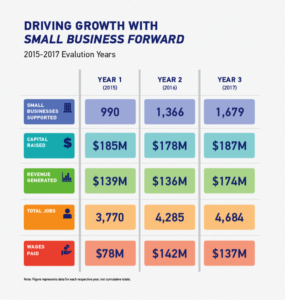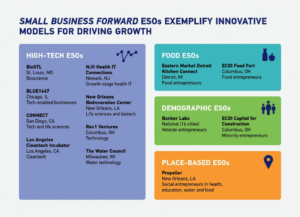Back

Blog
Twelve Organizations Driving More Inclusive Entrepreneurial Ecosystems
Written by Ted Archer, JPMorgan Chase and Kim Zeuli, ICIC
To address the critical gap in support for minority and women entrepreneurs, and catalyze a national conversation around inclusive economic growth, JPMorgan Chase has expanded their Small Business Forward initiative with a multi-year commitment of $150 million to support women-, minority- and veteran-owned small businesses with greater access to capital, technical support and guidance.
As part of the Small Business Forward initiative, JPMorgan Chase invests in entrepreneurial support organizations (ESOs) that support early-stage businesses and advance inclusive growth in cities across the U.S. In its first three years, Small Business Forward has partnered with a total of 15 ESOs to support over 4,000 small businesses.
In aggregate, across the three years, these businesses raised almost $550 million in capital, generated nearly $450 million in revenue, employed nearly 13,000 people and paid over $357 million in wages.
ICIC is proud to serve as a partner of Small Business Forward, annually measuring and analyzing the performance and impact of this dynamic cohort of ESOs. An earlier blog summarizes our comprehensive approach to this evaluation, which includes an annual survey of all businesses currently and previously supported by the ESOs. In the table below, we highlight some of the key impact metrics in each of the first three years of the initiative.
Over the past three years, Small Business Forward, through the ESOs it supports, has helped a growing number of small businesses (from 990 businesses in 2015 to 1,679 in 2017) receive critical business education and connections to capital to create more jobs. Because a different sample of businesses was surveyed each year, we cannot make year-over-year comparisons using the aggregate data. Capital, revenue and wages vary across the three years because of the different businesses captured in our survey, not because of any differences in ESO performance.

In 2017, we evaluated 12 organizations with innovative models for driving growth in a particular industry or with a specific population of entrepreneurs. In 2017, these ESOs supported nearly 1,700 businesses that raised $187 million in capital, generated over $174 million in revenue, employed over 4,600 people (including 29 percent local hires), and paid $137 million in wages.

This group of ESOs, and the businesses they support, are driving growth in communities across the U.S. Additionally, on the national stage, Small Business Forward ESOs are having an equally powerful impact by catalyzing their peers to create more inclusive organizations and demonstrating how to get there. In 2017, 26 percent of the businesses they supported were owned by women, and 28 percent were owned by minorities. Small Business Forward ESOs continue to experiment and refine their strategies for reaching and supporting more underrepresented entrepreneurs, but already offer innovative approaches for recruiting diverse entrepreneurs, developing customized programming to create greater effectiveness, and building more inclusive organizational cultures. We highlight effective strategies from each of the 12 ESOs below.
Building Diverse Entrepreneurial Pipelines
New Jersey Innovation Institute’s Health IT Connections program supports growth-stage health IT entrepreneurs by providing intensive training and mentoring and connecting businesses to new customers, strategic partners, and suppliers. Recognizing that it was critical to reach diverse entrepreneurs earlier in the lifecycle of their businesses to help them scale, NJII ran a special summer program for earlier stage health IT businesses, tapping on new partners including the Hispanic Chamber of Commerce and the New Jersey African American Chamber of Commerce to recruit underrepresented entrepreneurs. Several participants from the summer program have since graduated to the regular cohort program.
The Los Angeles Cleantech Incubator (LACI) supports cleantech startups by providing flexible space, business education, mentoring, and connections to investors. To recruit more underrepresented entrepreneurs to the sector, LACI has established a Diversity in Entrepreneurship Advisory Council, comprised of diverse leaders from industry, government, academia, and community-based organizations. This Council also helps to inform the design of customized programming, recruit diverse entrepreneurs, and ensure that the environment at LACI is inclusive and equitable.
Other ESOs are taking the long-view and supporting the growth of future entrepreneurs and new career paths for minority students. For example, The Water Council supports research, innovation, and business development to drive the growth of a regional water cluster in Milwaukee and southeast Wisconsin. Through a range of programming, The Water Council supports the commercialization of new water technology and connects small water technology businesses to talent, supply chains, and technical and capital resources. The organization has developed partnerships with several historically black colleges and universities (HBCUs) in the region to place college students in internship positions with cluster businesses it supports to expose them to entrepreneurship possibilities and career opportunities in water.
The New Orleans BioInnovation Center (NOBIC) is launching a parallel effort early this year. The bioscience incubator provides business assistance and invests in entrepreneurs to commercialize new technologies in the life sciences and biotech sectors. NOBIC is partnering with Xavier University of Louisiana, an HBCU, on a similar internship program to grow and retain diverse STEM talent in the region.
Location Matters
Many ESOs are establishing a physical presence in the communities they want to reach as a critical strategy for recruiting underrepresented entrepreneurs. The leadership of CONNECT, a business accelerator supporting tech and life sciences startups in San Diego, recognized the need to establish a new location outside the affluent La Jolla neighborhood it was based in to attract more diverse entrepreneurs. In 2016, the organization launched CONNECT ALL, an initiative to bridge the gap between underrepresented entrepreneurs and the innovation economy, out of a new, more accessible downtown location. Building on this success, in October CONNECT announced a new partnership with the City of San Diego and the Jacobs Center for Neighborhood Innovation to open a new business accelerator to grow local, early-stage businesses in the city’s historically-underserved Diamond neighborhood.
BLUE1647 is an entrepreneurship and technology innovation center focused on creating opportunity in underserved neighborhoods across Chicago. BLUE1647 offers technical assistance workshops and management training, as well as tailored cohort-based programs for women, men of color, and seniors over 50. Although the organization is based in Chicago’s underserved Pilsen community, BLUE1647 is working to expand its footprint and reach new communities of entrepreneurs. The organization is salvaging an old school bus as a mobile location and retrofitting a shipping container to use as a rotating pop-up site in neighborhoods around the city.
Eastern Market is taking a similar approach in Detroit, launching new satellite locations of its incubator program and commercial kitchen space, Detroit Kitchen Connect (DKC). By partnering with neighborhood churches and social service organizations with available kitchen space, DKC hopes to eliminate transportation barriers for entrepreneurs accessing their current location, and further support the growth of food businesses in Detroit’s underserved neighborhoods. DKC supports food entrepreneurs by providing access to licensed kitchen facilities, training on food regulations and licensing, as well as connecting them to new customers at Eastern Market’s popular weekly food markets.
Designing Customized Programming for Diverse Entrepreneurs
Underrepresented entrepreneurs may have different challenges or need different resources than their white, male counterparts. In an effort to fill these gaps, ESOs are developing tailored programming for specific populations of entrepreneurs. In Columbus, Ohio, the Economic Community Development Initiative (ECDI) launched Capital for Construction, a new program for minority contractors in the construction industry, a group that has not had equal access to opportunities created by the region’s construction boom. The cohort program connects the offers industry-specific trainings and mentorship. Additionally, participants will have access to low-interest loans through ECDI’s lending program, addressing the disproportionate impact that payment delays from general contractors have on minority subcontractors.
Bunker Labs is working to support the growth of veteran-owned businesses through local chapters in 16 cities across the U.S. Recently, Bunker Labs has made an concerted effort to make the resources and services it offers more accessible by moving all programming to the evening, weekend or online. This move to create more flexible programming is part of an intentional strategy to “de-risk” entrepreneurship so that the veterans Bunker Labs serves may hold day jobs and balance family commitments. As part of this strategy, Bunker Labs has introduced its new Launch Lab Online program, a gamified, interactive entrepreneurial education platform that allows entrepreneurs to self-pace their learning for additional flexibility. This also allows programming to reach veteran entrepreneurs outside of the large cities in which Bunker Labs chapters are located (e.g., rural areas, military bases, and even on active duty abroad).
New Orleans-based nonprofit Propeller supports social entrepreneurs tackling social and environmental disparities in health, education, water, and food. Last month, the organization launched the first cohort of its South Broad Business Initiative, a free six-month business assistance program designed to provide business owners of color with free workspace, mentorship, and comprehensive technical support. The program, which exclusively serves business owners in the neighborhoods surrounding Propeller’s location, provides intensive mentorship opportunities, matching each participant with an experienced business mentor, as well as a pro bono professional who provide project-based support in areas including technology updates, marketing, financials, and legal assistance.
Partnering for Collective Impact
Some ESOs are partnering with other community stakeholders to take a collective impact approach to promoting inclusive entrepreneurship. In St. Louis, BioSTL supports the creation and growth of new companies as a key lever to drive the growth of a regional bioscience cluster. In November, BioSTL launched St. Louis’ Equity in Entrepreneurship Collective, a partnership of regional ESOs, funders, and industry leaders working at a regional ecosystem level to address issues of race and gender equity in early-stage, tech-based entrepreneurship. This work builds on BioSTL’s Bioscience & Entrepreneurial Inclusion Initiative, a stream of programming designed to increase awareness about the field among professionals underrepresented in the biosciences, and provide them with entrepreneurial training and network connections.
Rev1 Ventures, located in Columbus, Ohio, has recognized that co-locating with community partners can create collisions with populations their organization might not normally reach and send the message that they are inclusive. The organization, which supports and invests in tech-enabled startups in the region, hosts a local chapter of Bunker Labs, as well as i.c.stars, which provides opportunities for low-income adults to develop advanced technology skills. Earlier this year, Rev1 also released their Inclusive Entrepreneurship White Paper, which summarizes the organization’s comprehensive diversity and inclusion strategy.
Building on “What Works”
Most ESOs in the U.S. recognize the importance of supporting diverse entrepreneurs and many have launched new strategies around diversity and inclusion. Few, however, would say they have been truly successful or have found the right strategies to achieve greater diversity and inclusion. In 2017, ICIC and JPMorgan Chase developed a community of practice among Small Business Forward ESOs through a series of peer learning opportunities focused on diversity and inclusion. Through these quarterly meetings, ESOs have the opportunity to identify common challenges, share lessons learned, and highlight best practices. This type of model needs to be replicated at a larger, national scale, and toolkits need to be developed for ESO leaders. By developing intentional strategies around diversity and inclusion, ESOs are well positioned to catalyze inclusive economic growth in cities across the U.S.
